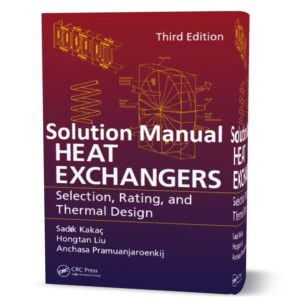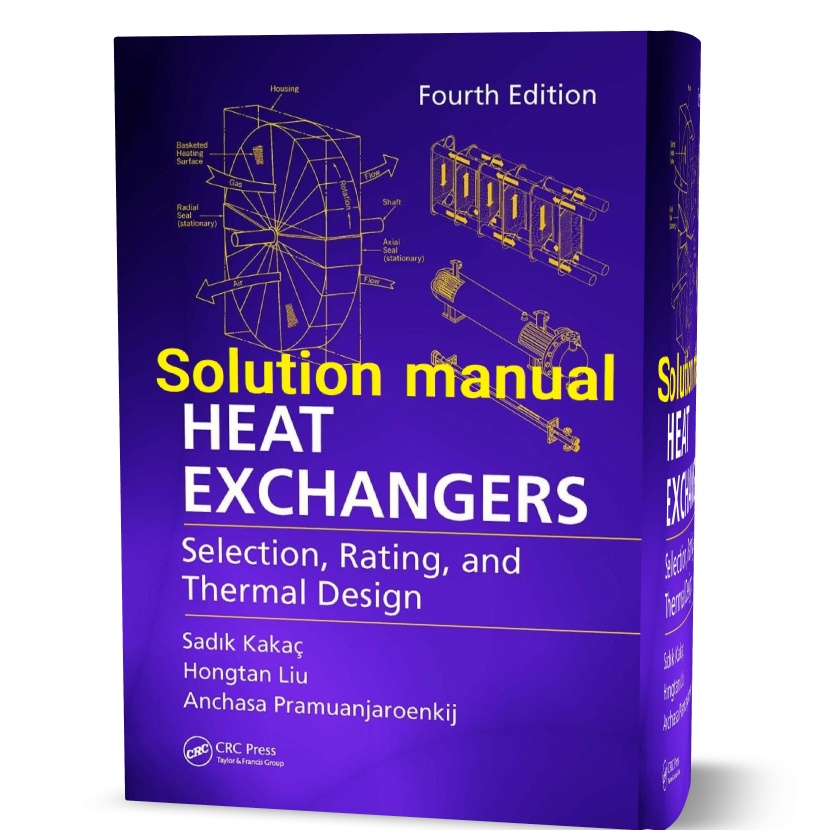دانلود حل المسائل کتاب مبدل های حرارتی انتخاب، رتبه بندی و طراحی حرارتی ویرایش چهارم به نویسندگی سادیک
heat exchangers selection rating and thermal design fourth edition solutions
نویسندگان: Sadik Kakac & Liu Hongtan & Anchasa Pramuanjaroenkij
مبدلهای حرارتی، دستگاههایی هستند که برای انتقال حرارت بین دو محیط با دماهای مختلف استفاده میشوند. این مبدلها در بسیاری از صنایع و برنامههای مختلف مانند پتروشیمی، نفت و گاز، تولید برق، خودروسازی و ساختمانها استفاده میشوند. در ادامه به بررسی انتخاب، رتبهبندی و طراحی حرارتی مبدلهای حرارتی میپردازیم: ebookband
- انتخاب مبدل حرارتی:
- نوع مبدل حرارتی: وابسته به نوع عملیات حرارتی و شرایط کاری، میتوانید از مبدلهای حرارتی مختلفی مانند صفحهای، لولهای، صفحهای-لولهای و جعبهای استفاده کنید.
- جریانهای محیطی: میزان ورودی و خروجی جریانهای محیطی را در نظر بگیرید. این شامل دبی، فشار و دما است.
- نوع حرارت: تعیین کنید که آیا انتقال حرارت در مبدل به صورت هدایت، جابجایی جرم، تشعشع یا ترکیبی اتفاق میافتد.
- رتبهبندی مبدل حرارتی:
- بازدهی: بازدهی مبدل حرارتی نسبت حاصل تقسیم حرارت منتقل شده به حداکثر حرارت قابل انتقال است. مبدلهایی با بازدهی بالا عملکرد بهتری دارند.
- ضریب انتقال حرارت: میزان انتقال حرارت در مبدل را مشخص میکند. این ضریب به عواملی مانند جریان، دما و خواص ماده مبدل بستگی دارد.
- نیروی هیدرولیک: در صورت استفاده از مبدلهای لولهای، نیروی هیدرولیک پایه رتبهبندی میشود.
این حل المسائل ویرایش چهارم میباشد 377 صفحه دارد و دارای 8.1 مگابایت حجم میباشد در این حل المسائل پاسخ فصل ها نوشته شده است. برای مشاهده نمونه بر روی لینک زیر کلیک نمایید.
heat exchangers kakac 3rd edition solutions manual
Heat exchangers are almost the most widely used member in chemical processes and can be seen in most industrial units. They are devices that allow the transfer of thermal energy between two or more fluids at different temperatures. This operation can be performed between liquid-liquid, gas-gas or gas-liquid. Heat exchangers are used to cool a hot fluid or to heat a fluid to a lower temperature, or both. for more information study download free Solution manual ( solutions ) Heat Exchangers by kakac | Selection , Rating and Thermal Design 3rd ( third ) 4th ( fourth ) edition eBook pdf . for more free solution manual click here.
heat exchangers kakac 3rd edition solutions
download free Solution manual ( solutions ) Heat Exchangers by kakac | Selection , Rating and Thermal Design 3rd ( third ) 4th ( fourth ) edition eBook pdf are used in a wide range of applications. These applications include power plants, refineries, petrochemical industries, manufacturing industries, process industries, food and pharmaceutical industries, metal smelting industries, heating, air conditioning, refrigeration systems and space applications. Heat exchangers in various devices such as boilers, steam generators, condensers, evaporators, evaporators, cooling towers, preheating fan coils, oil coolers and heaters, radiators, furnaces, etc. have.
heat exchangers kakac 3rd edition solution
Many industries are involved in the design of various types of heat exchangers, as well as several courses in colleges and universities with different names in the design of heat exchangers. IN download free Solution manual ( solutions ) Heat Exchangers by kakac | Selection , Rating and Thermal Design 3rd ( third ) 4th ( fourth ) edition eBook pdf Converter calculations are a long and sometimes tedious task. For example, designing a converter for a particular operation requires a lot of guesswork that can be used to find the right size of a converter according to the standards. But with the use of computer programs, all these calculations are done by the computer, and the designer only has to enter the operating conditions and the properties of the fluids present in the operation to design.
heat exchangers selection rating and thermal design third edition solutions
download free Solution manual ( solutions ) Heat Exchangers by kakac | Selection , Rating and Thermal Design 3rd ( third ) 4th ( fourth ) edition eBook pdf can be classified into three groups of low pressure, medium pressure and high pressure in terms of fluid working pressure. But often the study of heat exchangers is based on their design structure, which are
heat exchangers selection rating and thermal design third edition solution manual
The simplest converters used in the industry are double tube heat exchangers, also known as tubular heat exchangers and described in download free Solution manual ( solutions ) Heat Exchangers by kakac | Selection , Rating and Thermal Design 3rd ( third ) 4th ( fourth ) edition eBook pdf . On the one hand, the cheapness of these converters, both in terms of design and maintenance, has made them a good choice for small industries, and on the other hand, their low efficiency as well as large space occupation on a scale Large, has led to less use in today’s modern industries and more efficient converters such as shell and tube converters and plate converters. The structure of a tubular heat exchanger, in its simplest form, consists of two tubes of different diameters, the smaller tube being centrifuged inside the other tube.
دانلود نمونه رایگان حل المسائل
مشخصات حل المسائل ویرایش چهارم:
- ویرایش: 4th
- فرمت فایل: pdf
- حجم: 8.1MB
- تعداد صفحه: 377
If you want to pay with USD ( Dollar ) Click here
——————————————————————–
——————————————————————–

دانلود حل المسائل کتاب مبدل های حرارتی انتخاب، رتبه بندی و طراحی حرارتی ویرایش سوم به نویسندگی سادیک
heat exchangers selection rating and thermal design third edition solution manual
نویسندگان: Sadik Kakac & Liu Hongtan & Anchasa Pramuanjaroenkij
مبدلهای حرارتی، نوعی دستگاه هستند که برای انتقال حرارت از یک محیط به محیط دیگر استفاده میشوند. انتقال حرارت میتواند به صورت هدایت (conduction)، جابجایی جرم (convection) و تشعشع (radiation) صورت گیرد. مبدلهای حرارتی در صنایع مختلفی از جمله صنایع پتروشیمی، نفت و گاز، تولید برق، خودروسازی و ساختمانها استفاده میشوند.
برای انتخاب مناسب مبدل حرارتی، نیاز است به موارد زیر توجه کنید:
1. نوع مبدل حرارتی: بسته به نوع عملیات حرارتی و شرایط کاری، میتوان از مبدلهای حرارتی مختلفی مانند صفحهای، لولهای، صفحهای-لولهای و جعبهای استفاده کرد. هر نوع مبدل حرارتی ویژگیها و مزایا و معایب خاص خود را دارد.
2. جریانهای محیطی: بررسی کنید که در جریانهای محیطی ورودی و خروجی مبدل، دبی (flow rate)، فشار و دما چقدر است؛ زیرا این پارامترها تاثیر زیادی بر عملکرد مبدل حرارتی دارند.
3. نوع حرارت: مشخص کنید که انتقال حرارت در مبدل به صورت هدایت، جابجایی جرم، تشعشع یا ترکیبی اتفاق میافتد. نوع حرارت بستگی زیادی به شرایط فرایند و خواص مادههای مبدل دارد.
همچنین، در رتبهبندی مبدلهای حرارتی میتوانید به موارد زیر توجه کنید: ebookband.ir
1. بازدهی: بازدهی مبدل حرارتی نسبت حاصل تقسیم حرارت منتقل شده به حداکثر حرارت قابل انتقال است. مبدلهایی با بازدهی بالا عملکرد بهتری دارند.
2. ضریب انتقال حرارت: ضریب انتقال حرارت میزان انتقال حرارت در مبدل را مشخص میکند. این ضریب به عواملی مانند جریان، دما و خواص ماده مبدل بستگی دارد.
این حل المسائل ویرایش سوم میباشد 382 صفحه دارد و دارای 3.15 مگابایت حجم میباشد در این حل المسائل پاسخ فصل ها نوشته شده است. برای مشاهده نمونه بر روی لینک زیر کلیک نمایید.
heat exchangers kakac 4th edition solutions
One of the most common types of converters in various industries, including air conditioning and industrial refrigeration, is the shell and tube heat exchanger described in download free Solution manual ( solutions ) Heat Exchangers by kakac | Selection , Rating and Thermal Design 3rd ( third ) 4th ( fourth ) edition eBook pdf . As the name implies, these converters consist of a number of tubes that are housed inside a cylindrical shell. Two fluid streams with different initial temperatures enter the exchanger. One passes through the tubes and the other through the shell (outside the tubes). Heat is transferred through the wall of the pipes, between two fluids, sometimes from the fluid inside the tube to the fluid flowing in the shell and sometimes vice versa.
heat exchangers selection rating and thermal design fourth edition solutions
Each of the fluids can be liquids or gases, and it is possible for each to flow through a tube or shell. A transducer in which only a liquid or only a gas is flowing on either side (inside the shell and the tube) is called a single-phase transducer. Two-phase converters can be used to transfer heat to a liquid for boiling and evaporating it (boiler) or to cool steam to condense it (condenser) by phase change, which occurs mainly on the shell side.
solutions manual for heat exchangers selection rating and thermal design
Tubular converters are suitable for applications where either the flow rate of the passing fluids is low and large temperature variations are required, or low heat transfer is required for high flow rates. Of course, given the dimensions of tubular converters, it would make sense to use them when there is enough space. It is worth mentioning that in order to create more capacities, several pipe converter units can be installed in series or in parallel with each other, vertically. download free Solution manual ( solutions ) Heat Exchangers by kakac | Selection , Rating and Thermal Design 3rd ( third ) 4th ( fourth ) edition eBook pdf .Tube heat exchangers are most widely used in the food industry as well as air conditioners (such as boilers, evaporators or condensers).
دانلود نمونه رایگان حل المسائل
مشخصات حل المسائل ویرایش سوم:
- ویرایش: 3rd
- فرمت فایل: pdf
- حجم: 3.15MB
- تعداد صفحه: 382

